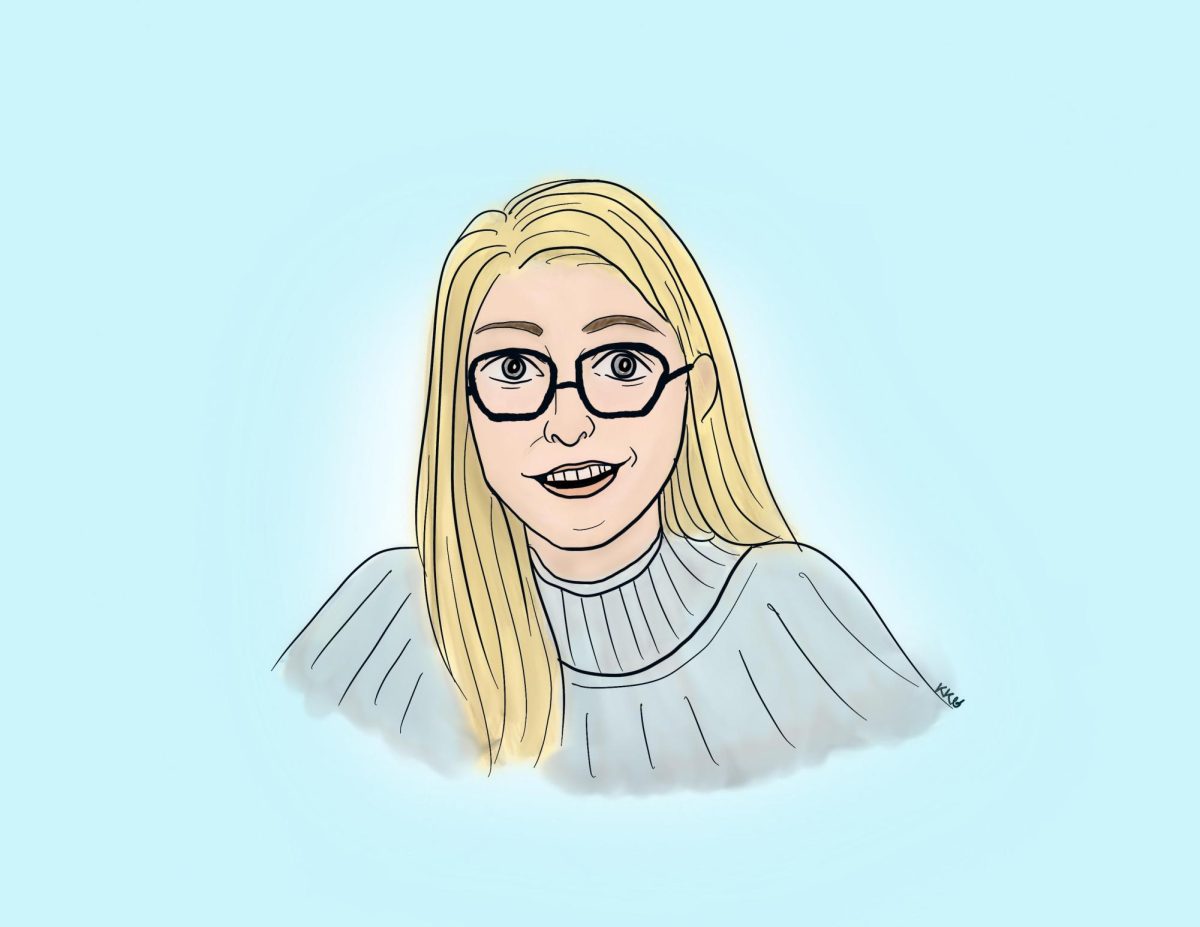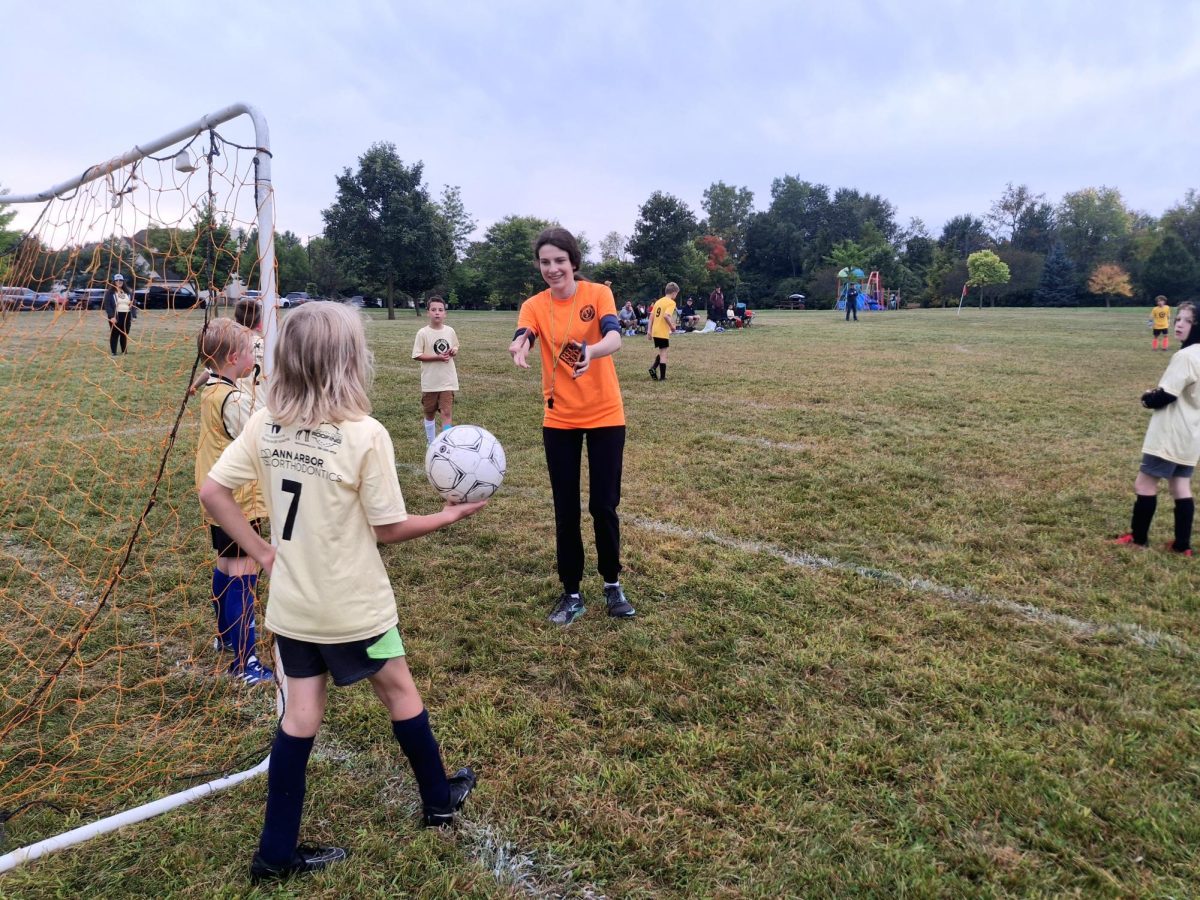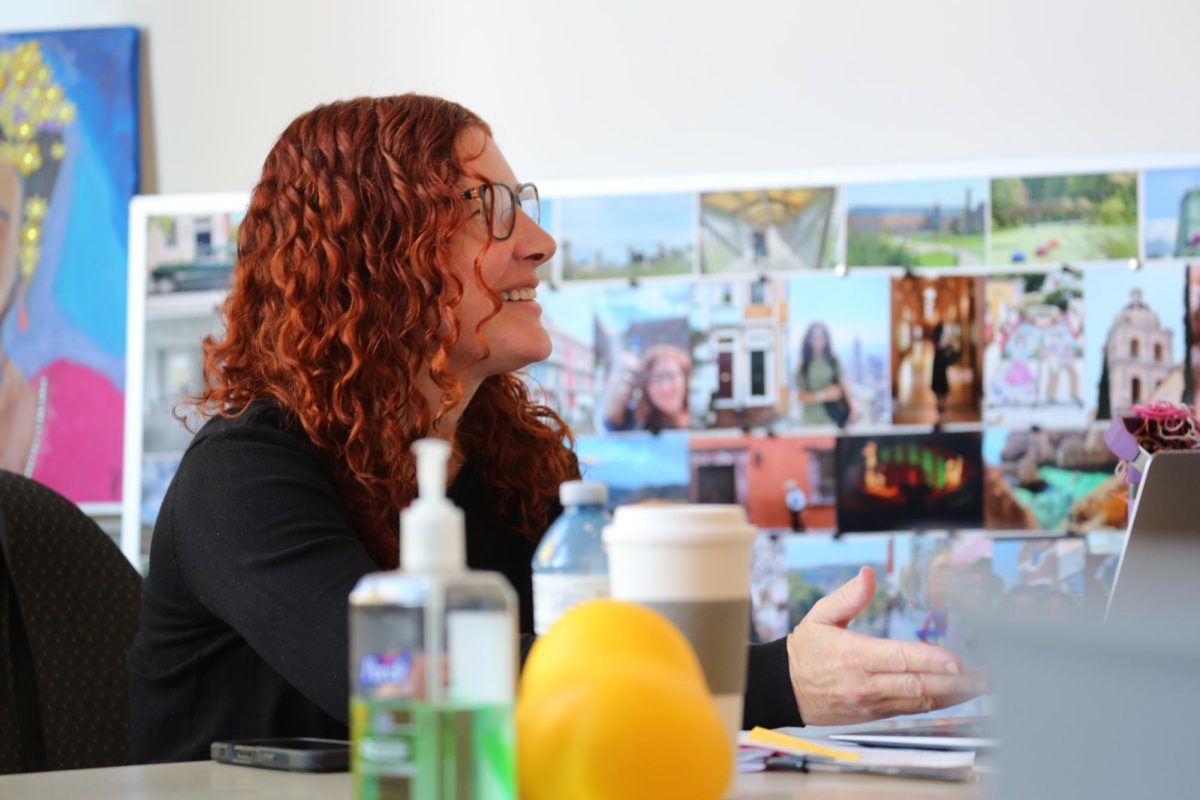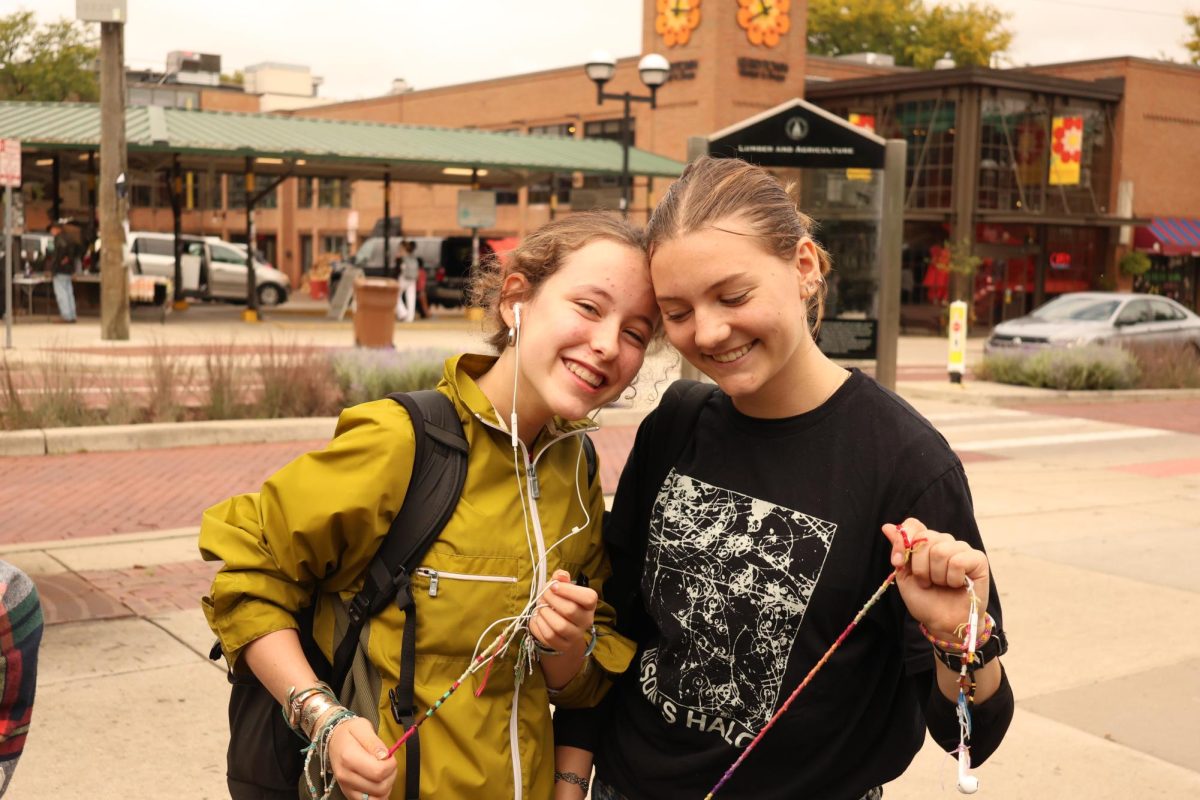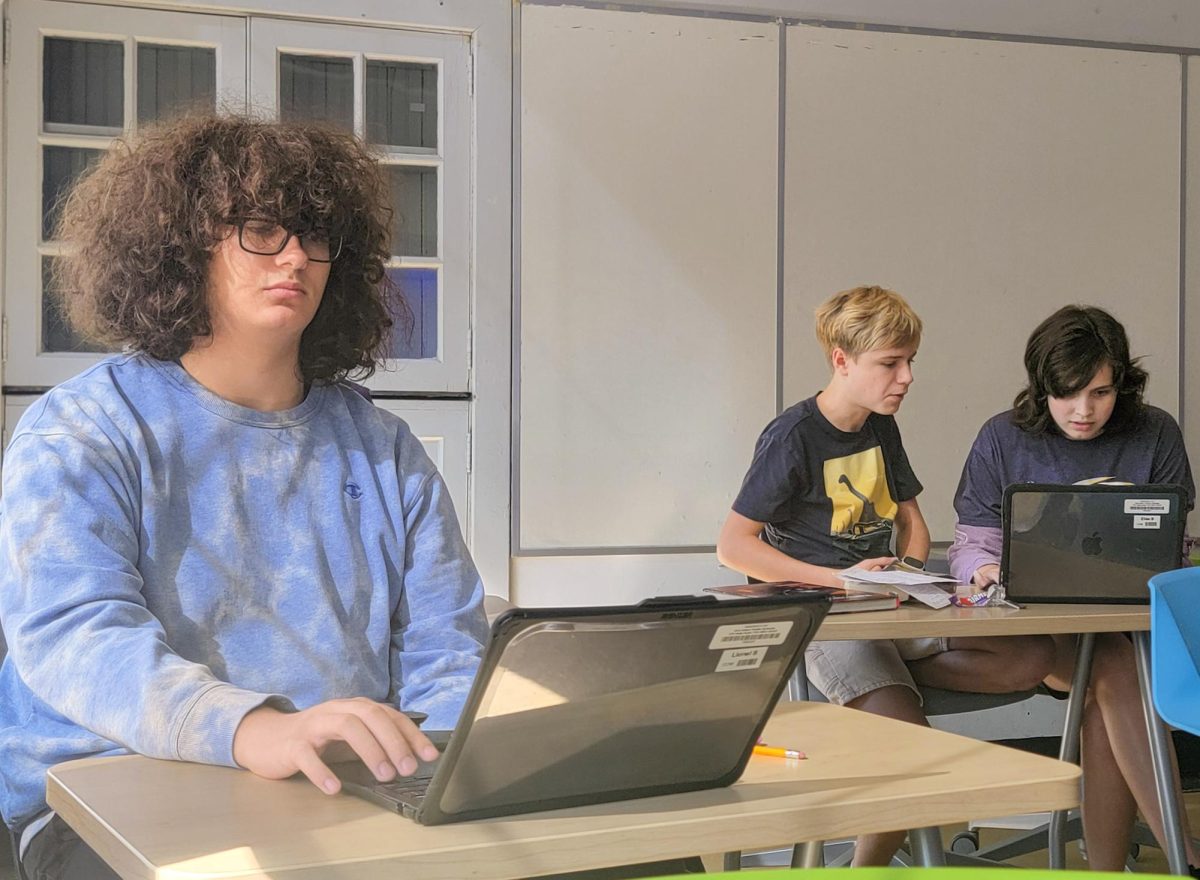Every morning at 8 a.m., students in room 311 of CHS take out their practice problems that were assigned to them the previous lesson. Next, they correct them via Schoology, which students use to keep up on their assignments. Determined, and sometimes exhausted from the previous evening, teacher Michelle Yager tries her best to encourage each student’s effort in correcting their assignment. To see where students’ flaws lay, Yager then makes her students complete lessons on Desmos, a graphing calculator. Though this process is strugglesome, Yager nevertheless loves working with her students.
“What made me like working with high school-aged kids is that you don’t have to treat them like employees, but instead work with them, teach them and encourage them to be proud of their efforts,” Yager said.
Yager has been teaching at CHS since November 2020 and was born and raised in Ann Arbor, Michigan.
Being the tallest person in her grade during Elementary School wasn’t easy for Yager. She faced plenty of discrimination for her height by her own “friends” and would often be excluded from their games. Her friends founded a “Short Girls Club,” a club which only short girls could be part of.
“I was devastated and I just remember the feeling of injustice, and I wanted to make sure that something like that never impacted me again,” Yager said. “Bullying people isn’t good, it doesn’t feel good and I think that’s when I learned to be more empathetic to other people. So from then on, I was always open to other people and the way they are.”
Yager grew up in northern Ann Arbor and attended Thurston Elementary School, Clague Middle School and Huron High School before attending the University of Michigan (U of M). She was raised in a family of teachers: Both sets of her grandparents had PhDs, her mother was a supervisor at U of M’s cytogenetics lab and her father was in the IT department.
On occasion, Yager put RadioShack kits together and created her own circuit boards with the help of her father. When Yager’s mother returned from her work, she would share scientific studies and findings from working with DNA or magazines. Yager’s knowledge of science accumulated over many years. However, contrary to her parents’ intentions, this eventually led Yager to dislike science. Instead, Yager hoped to study marketing with a bit of psychology so that she could make advertisements appeal to others.
“I graduated from the University of Michigan, I had a major in English with a minor in communication studies, with a little bit of psychology mixed in there, but not enough to be a minor or a major,” Yager explained. “Advertising seemed too big of a field to get all my credits in, so by then I just wanted to graduate. But then the market crashed [in 2009], and half of the advertising jobs just were gone.”
In 2009, Yager took a position at Briarwood Mall in Ann Arbor as an assistant manager and eventually was promoted to store manager. Yager was later relocated to Saginaw, Michigan and then back until she began receiving negative reviews.

“I kept getting in trouble for scheduling the good, hard workers and not the pretty people.” Yager said. “So I was getting bad scores on my reviews as an employee. And I was like, I’m done,”
After quitting her job at Briarwood Mall, Yager returned to the U of M to obtain her secondary teaching degree and certification for English. Her intention of becoming an English teacher and soccer coach seemed more of a fitting career for her. Though she merely wanted to learn how to share her love of English literature, her Secondary Master’s and Certification (SecMAC) program required a major and a minor. Due to her dislike of science, the only other subject with the second highest amount of credits she had was mathematics. After teaching a mix of English and math courses in the beginning of her teaching career, she now teaches math at CHS.
Applying for college was comparatively easy for Yager. In her college essay, Yager wrote about one of her experiences at a summer camp that was a big part of her life growing up: Keewaydin Temagami. During her stay, Yager had the honor to meet one of Canada’s indigenous tribes, known as the First Nations. Throughout the 19th century, Canada’s indigenous tribes were subject to assimilation enacted by the Canadian government. The First Nations’ sons and daughters were unwillingly relocated to boarding schools for many years. Upon their return, they struggled to reintegrate into their own tribes, later followed by rising suicide statistics for young people. Yager saw first hand how disconnected and defeated the First Nations were and witnessed their generational hardships.
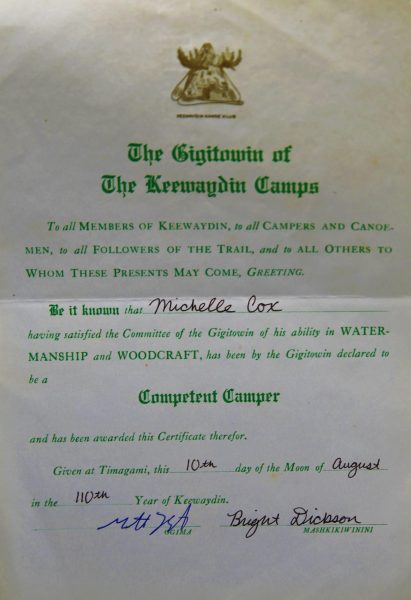
Yager was a legacy attendee at Keewaydin Temagami and attended from when she was in sixth grade up to her first year of college. As part of the camp’s staff, Yager met a six year old French girl who spoke very limited English. To Yager’s surprise, the girl carried “extremely heavy things” and accomplished “things one doesn’t think a six year old girl could do.” Yager believes that the girl played a pivotal role in her decision to become a staff member at Keewaydin Temagami in her junior year of high school.
Keewaydin Temagami consists of various trip lengths: two, five, fifteen, twenty-one and forty-nine day trips, usually taken in order corresponding to one’s age. However, the trips aren’t always completely safe: Hypothermia endangers one’s limbs and blackflies — a type of fly that digs its head into one’s skin — harass camp members. Yager once slept on the ground fully covered by moss next to a river bank. She was unmindful of a wasp nest located below her; Yager was stung.
To tackle these dangerous situations, it comes down to collaboration with other members.
“There was a thrill with being in the wilderness with the thought that we’re on our own,” Yager said. “We had to move together as a unit, so if someone is running behind or going slower, you cannot just leave them. We had to help each other get stronger physically and mentally. By the end of the summer, I felt so accomplished, and I also had a really great tan.”
Throughout the course of longer trips, food depletes, and although gathering food from the wilderness is encouraged, nature isn’t the main source of nutrition at Keewaydin Temagami. Campers often stopped at First Nations’ villages to retrieve their food supply and also immerse themselves in various local cultures. For instance, one of the remote villages Yager visited relied solely on hunting and fishing, with other extra supplies to campers that were extensively taxed by the Canadian government. According to Yager, cars and two-story houses were rarely seen on the reservation or shared by multiple families because many of the First Nations often lived in financial poverty.
During one of Yager’s visits to the First Nations, Yager had the honor of participating in a spiritual ritual practiced by the Anishinaabe, which was solely for women. The ritual involved the
spiritual cleansing of one’s body through the process of sweating in a specifically designated sweat lodge. Though the sweat lodge assisted in the purification, women already cleanse themselves through a natural way of matter: The menstrual period. One of Yager’s companions unconventionally had her menstruation for the entire time of their visit, and she was not permitted to enter the sweat lodge.
With the help of the sweat lodge, Yager attained a different perspective of self-care and spiritual peace, influencing her to now focus on honing her teaching skills.
“I feel like I’m really hitting my stride with my Algebra one class this year,” Yager said. “But every year my student population always makes me question myself. I think the best way of improving myself is to learn about and use multiple ways to assess my students’ skills and how to grow those skills as they progress in the Algebra one content.”
In her leisure hours, Yager enjoys reading and playing video games, serving as an “escape from reality.” However, her life hasn’t been without hardship; she experienced a great loss when her grandmother — an important figure in her life — had passed away. Her grandmother was her hero, admired for being a feminist icon who defied societal norms of the 1940s, 1950s and 1960s. Despite this loss, Yager maintains a positive outlook on life, drawing her strength from humor and witty remarks. She surrounds herself with her supportive community, including her family, friends, husband and her two young children.
Yager often opts to channel her energy into both her personal and professional growth, balancing her strengths and weaknesses. She wants to be a caring and knowledgeable individual who always strives for perfection. However, she admits that her tendency to avoid doing things halfway can lead to procrastination.
“I’m very lazy at times,” Yager said. “Sometimes, I wait until Sunday night to plan my week’s lessons, because if I start at the beginning of the week, I’ll end up spending the whole time perfecting them. But if I start at the end of the weekend, I now only have until it’s time for bed.”
Through Yager’s story, she exemplifies the resiliency that comes from embracing both challenges and joys in life. Her ability to balance personal growth with self-awareness serves as an inspiring reminder of the importance of perseverance and community.



